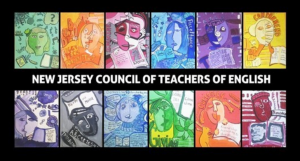Greetings, NJCTE Blog Readers! This is your friendly and vigilant citizen activist English language arts educator, Pat Schall, returning with yet another suggestion for making your voices heard in a challenging political climate.
This time my suggestion for activism encourages more creativity and less correspondence and calls. Sound interesting? Hey, the holiday break should give you a little more time to charge those creative batteries.
 Have you heard about the seven words/phrases the Trump administration put on a usage “hit list” for the CDC (Center for Disease Control)? The Washington Post reports that the CDC employees may not use these word/phrases in their writing: “vulnerable, entitlement, diversity, transgender, fetus, evidence-based, and science-based.” How about entering a banned word poetry/poetic language contest with several options for creative expression using these forbidden words?
Have you heard about the seven words/phrases the Trump administration put on a usage “hit list” for the CDC (Center for Disease Control)? The Washington Post reports that the CDC employees may not use these word/phrases in their writing: “vulnerable, entitlement, diversity, transgender, fetus, evidence-based, and science-based.” How about entering a banned word poetry/poetic language contest with several options for creative expression using these forbidden words?
Recently, I was checking some social media postings and found an entry from Sara Freligh’s blog. Sarah is an author and a recipient of an NEA (National Endowment for the Arts) fellowship in poetry. She and Amy Lemmon are hosting a poetry writing contest using the CDC banned words. You will find specific guidelines for writing and submission in the blog post.
Freligh and Lemmon are flexible about the format and encourage “prose poems/microfiction, or even short plays. Forms that use repetition and/or use the required words in inventive ways are especially encouraged. Work may include visual or multimedia elements within the range of literary work. Video or audio submissions should be accompanied by text transcript.” There are so many possibilities and formats, traditional and non-traditional. They advise writers that “poems will be accepted on a rolling basis for publication on the blog. One new poem by a different writer will be published each week day, Monday through Friday starting January 1, 2018.”
The idea of a “rolling basis for publication” appeals to me and may provide just the kind of incentive and flexible deadline a busy teacher/writer needs to participate and to take a stand against censorship that matches NCTE’s mission to preserve intellectual freedom.
NJCTE will host our Annual Conference on Saturday, March 24, 2018, at Montclair State University. This would be a good forum for sharing some of the poems our members submit to this contest, whether or not they are chosen to appear on the blog. Why not get your creative juices flowing and participate? Here is another chance to be a creative citizen activist and stand up for freedom of speech.
Enjoy the holidays, the break, and this opportunity to let your voice be heard!
Written by Pat Schall, NJCTE Board Member
Posted by Audrey Fisch, blog editor for NJCTE
 New Jersey Council of Teachers of English, the New Jersey state affiliate of NCTE, the National Council of Teachers of English
New Jersey Council of Teachers of English, the New Jersey state affiliate of NCTE, the National Council of Teachers of English


